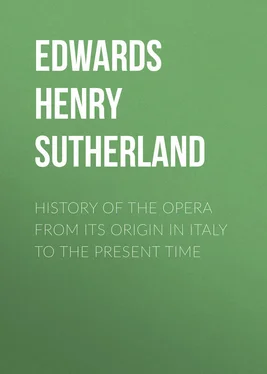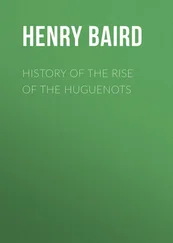Henry Edwards - History of the Opera from its Origin in Italy to the present Time
Здесь есть возможность читать онлайн «Henry Edwards - History of the Opera from its Origin in Italy to the present Time» — ознакомительный отрывок электронной книги совершенно бесплатно, а после прочтения отрывка купить полную версию. В некоторых случаях можно слушать аудио, скачать через торрент в формате fb2 и присутствует краткое содержание. Жанр: foreign_home, music_dancing, foreign_antique, foreign_prose, на английском языке. Описание произведения, (предисловие) а так же отзывы посетителей доступны на портале библиотеки ЛибКат.
- Название:History of the Opera from its Origin in Italy to the present Time
- Автор:
- Жанр:
- Год:неизвестен
- ISBN:нет данных
- Рейтинг книги:4 / 5. Голосов: 1
-
Избранное:Добавить в избранное
- Отзывы:
-
Ваша оценка:
- 80
- 1
- 2
- 3
- 4
- 5
History of the Opera from its Origin in Italy to the present Time: краткое содержание, описание и аннотация
Предлагаем к чтению аннотацию, описание, краткое содержание или предисловие (зависит от того, что написал сам автор книги «History of the Opera from its Origin in Italy to the present Time»). Если вы не нашли необходимую информацию о книге — напишите в комментариях, мы постараемся отыскать её.
History of the Opera from its Origin in Italy to the present Time — читать онлайн ознакомительный отрывок
Ниже представлен текст книги, разбитый по страницам. Система сохранения места последней прочитанной страницы, позволяет с удобством читать онлайн бесплатно книгу «History of the Opera from its Origin in Italy to the present Time», без необходимости каждый раз заново искать на чём Вы остановились. Поставьте закладку, и сможете в любой момент перейти на страницу, на которой закончили чтение.
Интервал:
Закладка:
Lulli also composed music for the interludes and songs in Molière's comedies, in which he sometimes appeared himself as a singer, and even as a burlesque actor. Once, when the musical arrangements were not quite ready for a ballet, in which the king was to play four parts – the House of France, Pluto, Mars and the Sun – he replied, on receiving a command to proceed with the piece – " Le roi est le maitre; il peut attendre tant qu'il lui plaira. " His majesty did not, as I have seen it stated, laugh at the facetious impertinence of his musician. On the contrary, he was seriously offended; and great was Lulli's alarm when he found that neither the House of France, nor Pluto, nor Mars, nor the Sun, would smile at the pleasantries with which, as the performance went on, he endeavoured to atone for his unbecoming speech. The wrath of the Great Monarch was not to be appeased, and Lulli's enemies already began to rejoice at his threatened downfall.
Fortunately, Molière was at Versailles. Lulli asked him at the conclusion of the ballet to announce a performance of M. de Pourceaugnac , a piece which never failed to divert Louis; and it was arranged that just before the rise of the curtain Molière should excuse himself, on the score of a sudden indisposition, from appearing in the principal character. When there seemed to be no chance of M. de Pourceaugnac being played, Lulli, that the king might not be disappointed, nobly volunteered to undertake the part of the hero, and exerted himself in an unprecedented manner to do it justice. But his majesty, who generally found the troubles of the Limousin gentleman so amusing, on this occasion did not even smile. The great scene was about to begin; the scene in which the apothecaries, armed with their terrible weapons, attack M. de Pourceaugnac and chase him round the stage. Louis looked graver than ever. Then the comedian, as a last hope, rushed from the back of the stage to the foot lights, sprang into the orchestra, alighted on the harpsichord, and smashed it into a thousand pieces. "By this fall he rose." Probably he hurt himself, but no matter; on looking round he saw the Great Monarch in convulsions of laughter. Encouraged by his success, he climbed back through the prompter's box on to the stage; the royal mirth increased, and Lulli was now once more reinstated in the good graces of his sovereign.
Molière had a high opinion of Lulli's facetious powers. " Fais nous rire, Baptiste ," he would say, and it cannot have been any sort of joke that would have excited the laughter of the greatest of comic writers. Nevertheless, he fell out with Lulli when the latter attained the "privilege" of the Opera, and, profiting by the monopoly which it secured to him, forbade the author of Tartuffe to introduce more than two singers in his interludes, or to employ more than six violins in his orchestra. Accordingly, Molière entrusted the composition of the music for the Malade Imaginaire , to Charpentier. The songs and symphonies of all his other pieces, with the exception of Mélicerte , were composed by Lulli.
The story of Lulli's obtaining letters of nobility through the excellence of his buffoonery in the part of the Muphti, in the Bourgeois Gentilhomme has often been told. This was in 1670, but once a noble, and director of the Royal Academy of Music, he showed but little disposition to contribute to the diversion of others, even by the exercise of his legitimate art. Not only did he refuse to play the violin, but he would not even have one in his house. To overcome Lulli's repugnance in this respect, Marshal de Gramont hit upon a very ingenious plan. He used to make one of his servants who possessed the gift of converting music into noise, play the violin in Lulli's presence. Upon this, the highly susceptible musician would snatch the instrument from the valet's hands, and restore the murdered melody to life and beauty; then, excited by the pleasure of producing music, he forgot all around him, and continued to play to the great delight of the marshal.
Many curious stories are told of Lafontaine's want of success as a librettist; Lulli refused three of his operas, one after the other, Daphné , Astrée , and Acis et Galathée – the Acis et Galathée set to music by Lulli being the work of Campistron. At the first representation of Astrée , of which the music had been written by Colasse (a composer who imitated and often plagiarised from Lulli), Lafontaine was present in a box behind some ladies who did not know him. He kept exclaiming every moment, "Detestable! detestable!"
Tired of hearing the same thing repeated so many times, the ladies at last turned round and said, "It is really not so bad. The author is a man of considerable wit; it is written by M. de la Fontaine."
" Cela ne vaut pas le diable ," replied the librettist , "and this Lafontaine of whom you speak is an ass. I am Lafontaine, and ought to know."
After the first act he left the theatre and went into the Café Marion, where he fell asleep. One of his friends came in, and surprised to see him, said – "M. de la Fontaine! How is this? Ought you not to be at the first performance of your opera?"
The author awoke, and said, with a yawn – "I've been; and the first act was so dull that I had not the courage to wait for the other. I admire the patience of these Parisians!"
Compare this with the similar conduct of an English humourist, Charles Lamb, who, meeting with no greater success as a dramatist than Lafontaine, was equally astonished at the patience of the public, and remained in the pit to hiss his own farce.
Colasse, Lafontaine's composer, and Campistron, one of Lulli's librettists – when Quinault was not in the way – occasionally worked together, and with no very favourable result. Hence, mutual reproaches, each attributing the failure of the opera to the stupidity of the other. This suggested the following epigram, which, under similar circumstances, has been often imitated: —
"Entre Campistron et Colasse,
Grand débat s'émeut au Parnasse,
Sur ce que l'opéra n'a pas un sort heureux.
De son mauvais succès nul ne se croit coupable.
L'un dit que la musique est plate et misérable,
L'autre que la conduite et les vers sont affreux;
Et le grand Apollon, toujours juge équitable,
Trouve qu'ils ont raison tous deux."
Quinault was by far the most successful of Lulli's librettists, in spite of the contempt with which his verses were always treated by Boileau. Boileau liked Lulli's music, but when he entered the Opera, and was asked where he would sit, he used to reply, "Put me in some place where I shall not be able to hear the words."
Lulli must have had sad trouble with his orchestra, for in his time a violinist was looked upon as merely an adjunct to a dancing-master. There was a king of the fiddles, without whose permission no cat-gut could be scraped; and in selling his licenses to dancing-masters and the musicians of ball-rooms, the ruler of the bows does not appear to have required any proof of capacity from his clients. Even the simple expedient of shifting was unknown to Lulli's violinists, and for years after his death, to reach the C above the line was a notable feat. The pit quite understood the difficulty, and when the dreaded démanchement had to be accomplished, would indulge in sarcastic shouts of " gare l'ut! gare l'ut! "
The violin was not in much repute in the 17th, and still less in the 16th, century. The lute was a classical instrument; the harp was the instrument of the Troubadours; but the fiddle was fit only for servants, and fiddlers and servants were classed together.
Читать дальшеИнтервал:
Закладка:
Похожие книги на «History of the Opera from its Origin in Italy to the present Time»
Представляем Вашему вниманию похожие книги на «History of the Opera from its Origin in Italy to the present Time» списком для выбора. Мы отобрали схожую по названию и смыслу литературу в надежде предоставить читателям больше вариантов отыскать новые, интересные, ещё непрочитанные произведения.
Обсуждение, отзывы о книге «History of the Opera from its Origin in Italy to the present Time» и просто собственные мнения читателей. Оставьте ваши комментарии, напишите, что Вы думаете о произведении, его смысле или главных героях. Укажите что конкретно понравилось, а что нет, и почему Вы так считаете.












